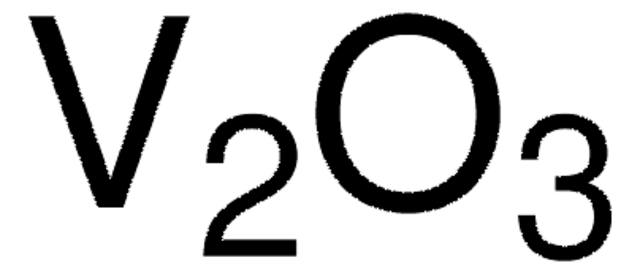215066
Gallium(III) oxide
≥99.99% trace metals basis
Sinónimos:
Gallium trioxide
Iniciar sesiónpara Ver la Fijación de precios por contrato y de la organización
About This Item
Fórmula empírica (notación de Hill):
Ga2O3
Número de CAS:
Peso molecular:
187.44
Número CE:
Número MDL:
Código UNSPSC:
12352303
ID de la sustancia en PubChem:
NACRES:
NA.23
Productos recomendados
Nivel de calidad
Análisis
≥99.99% trace metals basis
formulario
(crystalline powder)
idoneidad de la reacción
reagent type: catalyst
core: gallium
densidad
5.88 g/mL at 25 °C
cadena SMILES
O=[Ga]O[Ga]=O
InChI
1S/2Ga.3O
Clave InChI
QZQVBEXLDFYHSR-UHFFFAOYSA-N
¿Está buscando productos similares? Visita Guía de comparación de productos
Descripción general
Gallium(III) oxide (Ga2O3) is a wide band gap semiconductor that belongs to a family of transparent semiconducting oxides (TSO). It can form different polymorphs such as α-,β-, γ-, δ-, and ε-. Polycrystalline and nanocrystalline Ga2O3 can be prepared using several methods such as chemical vapor deposition, thermal vaporization, and sublimation, molecular beam epitaxy, melt growth, etc. It is widely used as a functional material in various applications including optoelectronics, chemical sensors, catalysis, semiconductor devices, field-effect transistors, and many others.
Aplicación
Ga2O3 is widely used as a host material for the fabrication of electroluminescent devices. For example, europium-doped Ga2O3 thin films can be used as a light-emitting layer to fabricate an optically transparent electroluminescent device.
Due to its distinct optical and electrical properties like moderate conductivity and high laser damage threshold, Ga2O3 can be used in laser-driven electron accelerators, low-loss plasmonics, and Si-based dielectric laser accelerators.
It can also be used as an effective catalyst for the dehydrogenation of propane to propene.
Due to its distinct optical and electrical properties like moderate conductivity and high laser damage threshold, Ga2O3 can be used in laser-driven electron accelerators, low-loss plasmonics, and Si-based dielectric laser accelerators.
It can also be used as an effective catalyst for the dehydrogenation of propane to propene.
Starting material for the preparation of Sr2CuGaO3S, an example of a rare square pyramidal gallium.
Código de clase de almacenamiento
11 - Combustible Solids
Clase de riesgo para el agua (WGK)
WGK 2
Punto de inflamabilidad (°F)
Not applicable
Punto de inflamabilidad (°C)
Not applicable
Equipo de protección personal
Eyeshields, Gloves, type N95 (US)
Elija entre una de las versiones más recientes:
¿Ya tiene este producto?
Encuentre la documentación para los productos que ha comprado recientemente en la Biblioteca de documentos.
Los clientes también vieron
Bipin Pandey et al.
Langmuir : the ACS journal of surfaces and colloids, 28(38), 13705-13711 (2012-09-01)
This paper reports the formation of self-organized nanoporous gallium oxide by anodization of solid gallium metal. Because of its low melting point (ca. 30 °C), metallic gallium can be shaped into flexible structures, permitting the fabrication of nanoporous anodic oxide
Vladimir N Sigaev et al.
Nanoscale, 5(1), 299-306 (2012-11-21)
Nanoparticles in amorphous oxides are a powerful tool for embedding a wide range of functions in optical glasses, which are still the best solutions in several applications in the ever growing field of photonics. However, the control of the nanoparticle
Sr(2)CuGaO(3)S, a Rare Example of Square Pyramidal Gallium.
W. J. Zhu et al.
Inorganic chemistry, 36(17), 3576-3577 (1997-08-13)
Yi-Jen Wu et al.
ACS nano, 4(3), 1393-1398 (2010-02-13)
Light-scattering properties of individual gold-in-Ga(2)O(3) peapod nanowires and gold-in-Ga(2)O(3) core/shell nanowires were investigated by optical dark-field microscopy. The observed scattering peaks are suggested to result from plasmonic resonance of the gold nanopeas and nanorods in the Ga(2)O(3) nanowires. As the
Rujia Zou et al.
Small (Weinheim an der Bergstrasse, Germany), 7(23), 3377-3384 (2011-10-06)
Nanoelectromechanical system switches are seen as key devices for fast switching in communication networks since they can be switched between transmitting and receiving states with an electrostatic command. Herein, the fabrication of practical, nanoscale electrically/thermally driven switches is reported based
Nuestro equipo de científicos tiene experiencia en todas las áreas de investigación: Ciencias de la vida, Ciencia de los materiales, Síntesis química, Cromatografía, Analítica y muchas otras.
Póngase en contacto con el Servicio técnico










